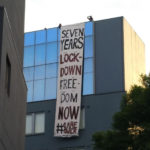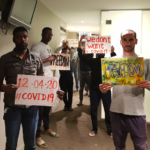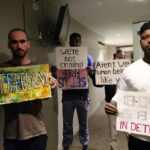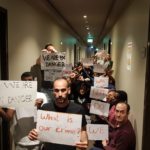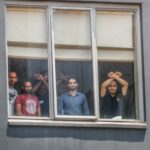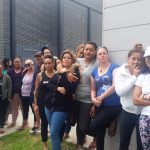“Seven Dark Years in Detention for What?”: An Interview With Kangaroo Point Detainee Abdullah Moradi
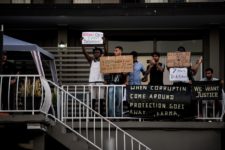
Right now, the Australian government is continuing to hold over 100 men at Kangaroo Point Central Hotel in inner city Brisbane, in a similar manner to how these asylum seekers were previously locked up on Manus and Nauru.
These men travelled to Australia by boat around seven years ago. They came to this country fleeing persecution in their homelands, expecting protection under the auspices of the 1951 UN Refugee Convention, which this nation ratified in 1954.
The detainees held at Kangaroo Point – which is now classed as an alternative place of detention (APOD) – were flown to Australia, under the Medevac laws, to receive medical treatment, of which they’ve received next to none.
Throughout the entire COVID-19 pandemic, these men have continued to be held in cramped conditions, without any protective measures. And as new post-lockdown virus cases begin presenting in the community, these detainees are now at a heightened risk of catching it.
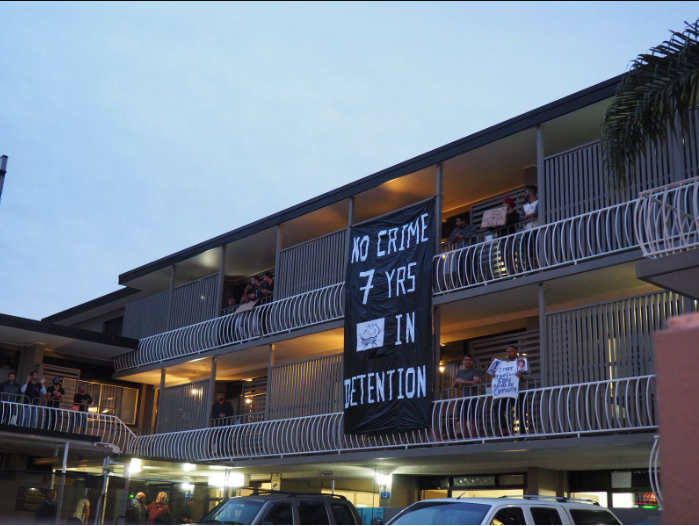
Silencing the vulnerable
Despite having done nothing to allow the around 1,400 people being held in immigration detention to protect themselves from a virus that closed down the planet, recent developments show that the home affairs minister has had these individuals on his mind.
Peter Dutton took the moment when a shutdown federal parliament reconvened for emergency sitting days to introduce legislation that would allow Australian Border Force and Serco officers to confiscate the phones of those in immigration detention.
As National Justice Project principal solicitor George Newhouse explained last week, “Mobile phones are a lifeline to the outside world that enables individuals to maintain their sanity and communicate” with family, advocates and their legal representatives.
Solidarity in the community
For the last month, the asylum-seekers at Kangaroo Point have been staging daily protests on the balcony of the hotel, holding placards to notify the community of their plight, which involves not being able to practice social distancing, while unprotected guards come and go on a daily basis.
But, these men have been feeling some hope, as members of the community – including Refugee Solidarity Meanjin – have been gathering out front of the hotel to show their solidarity. And for their trouble, Queensland police officers have gifted some of these activists with fines of $1,334.
Abdullah Moradi is one of the men being held at Kangaroo Point. The 39-year-old arrived in Australian waters in September 2013. And prior to being flown to Brisbane in August last year, he was detained at the notorious Manus Island Regional Processing Centre.
Sydney Criminal Lawyers spoke to Mr Moradi about the conditions he and over 100 other men are being subjected to during the pandemic, the toll this is taking upon their mental health, and what it means to the detainees to see people out in the community supporting them.
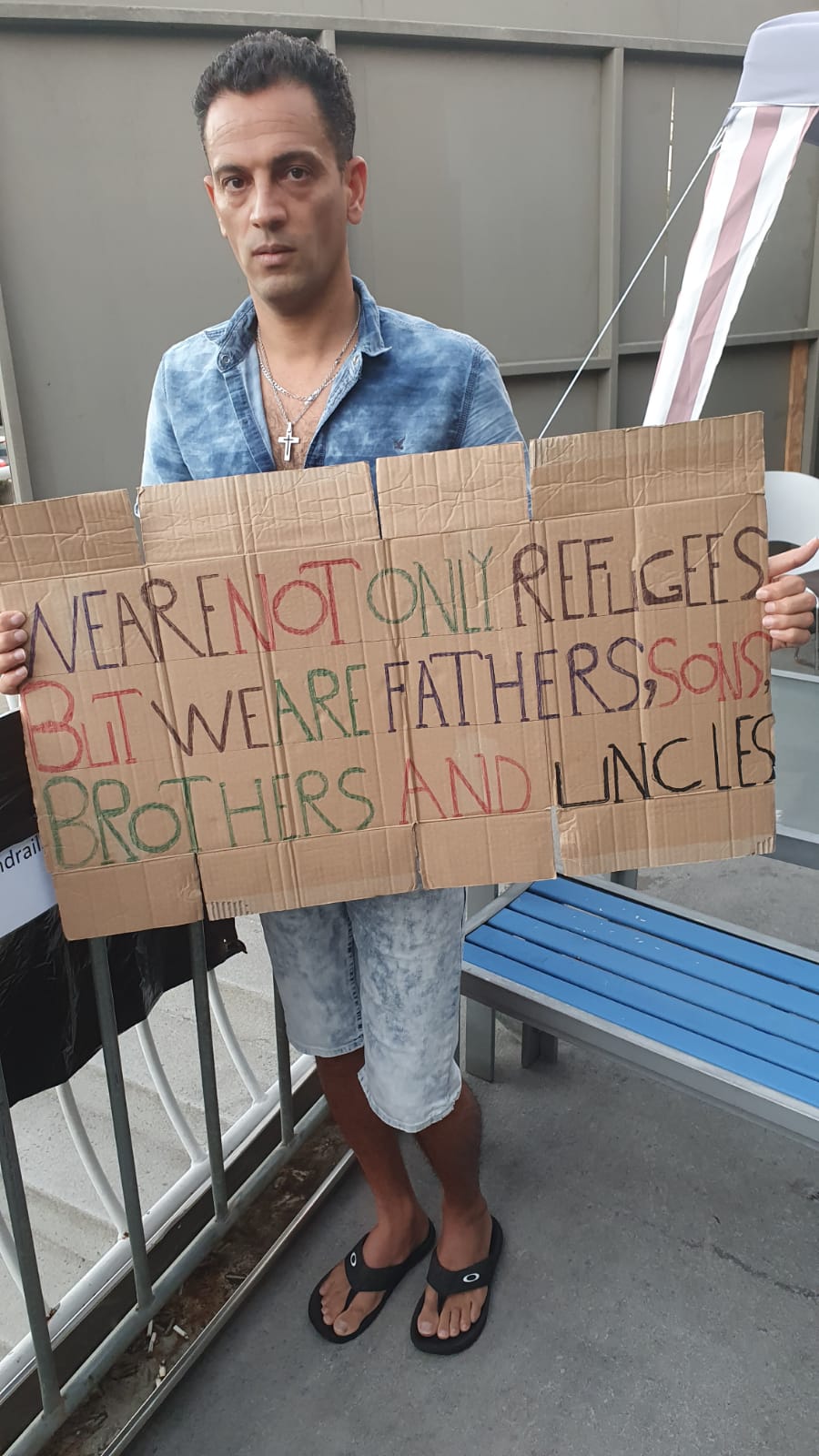
Firstly, you’re being held at the Kangaroo Point Hotel in Brisbane during the COVID-19 pandemic. And over recent weeks, Queensland has started lifting the pandemic restrictions within the wider community.
Abdullah, do you feel under any less threat from the virus now that the government is easing restrictions?
It’s good news for Australian people and the community. I am happy Australia has controlled the virus. And I say thank you to Australian doctors and nurses.
But, we are still at risk, because this coronavirus is dangerous and anyone can bring it in here.
There was a COVID-19 scare early on at Kangaroo Point, as one of the Serco guards tested positive to the virus in March, I believe.
One of the Serco guards was positive with the coronavirus. This was very bad for us. The guard could have come in here and caused big problems for the refugee people, because if one of us catches it in here, it’s a problem for all of us.
The Serco guards should always be careful about the coronavirus. The virus doesn’t respect if anyone has a visa or passport, it kills people.
We don’t know where the guards have been and who they have seen. It’s so easy for them to bring the coronavirus in here. It can be caught by hand, on clothes or in a car. The coronavirus can be caught anywhere.
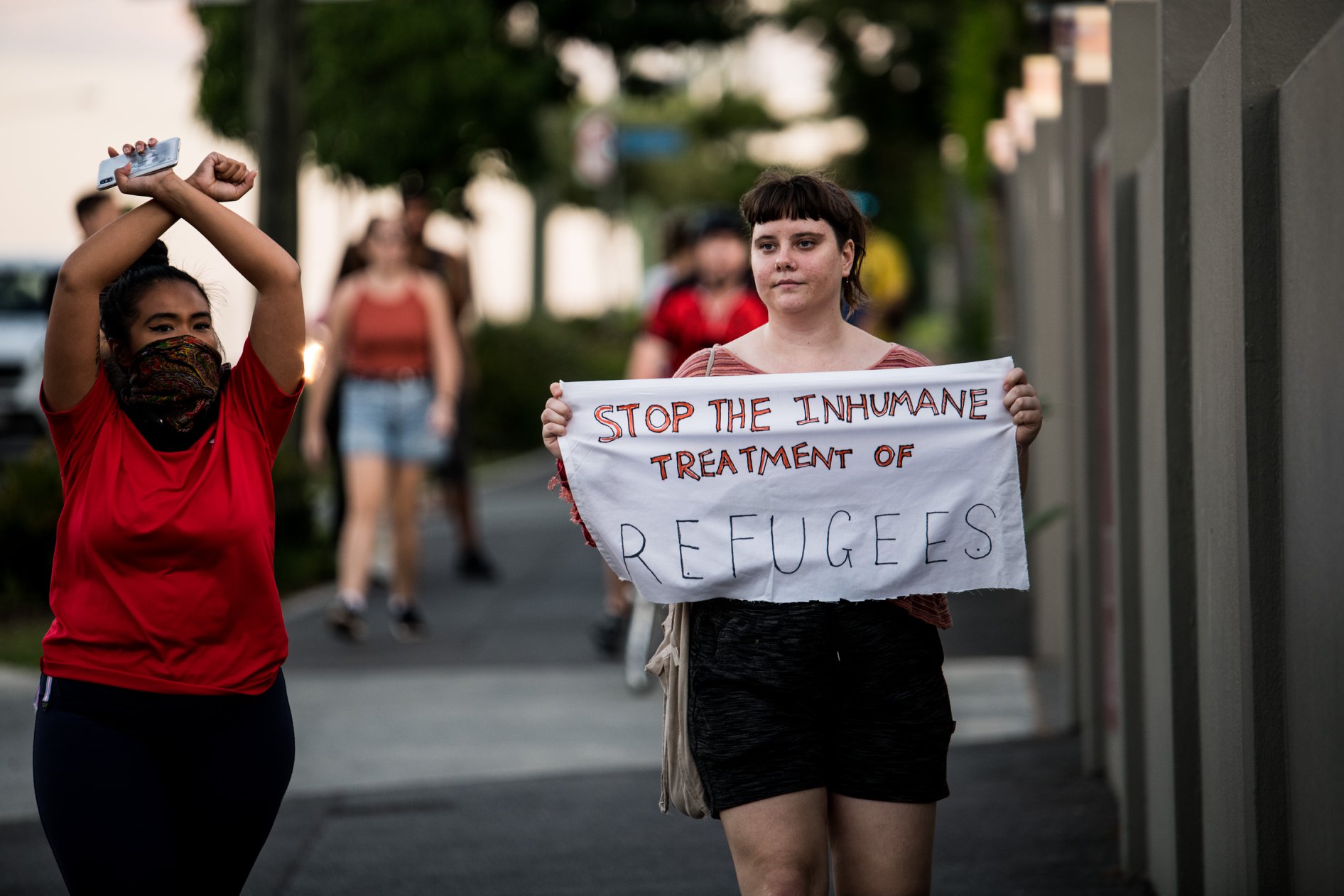
What is it about the conditions you’re being kept in at Kangaroo Point that means you’re at a heightened risk?
We don’t have any space to stay away from each other. We only have small rooms. It’s so dangerous, because a lot of staff and other people come to the hotel.
We are over one hundred people in here. There are also more than 100 Serco guards. And there are hotel staff coming here too. There are cleaners, kitchen staff and maintenance.
When the guards come here, they’ve come from the community. We don’t know where they were the last night. We don’t know who they were with. And we don’t know where they were last week.
These people could bring the coronavirus into the hotel. So, we always stay inside the room. For more than 23 hours a day, we’re inside the room.
We only go outside for 30 minutes for the protest and then we go in line for lunch and dinner. We are always inside the room, because we don’t have anywhere else safe enough.
The asylum seekers at Kangaroo Point have already been detained under extreme conditions in offshore detention for many years.
And now you’re being locked in a hotel with no protection during a killer virus outbreak. What sort of a toll is this having on those being held there?
We came here for medical treatment. We should be free and seeing a special doctor. We’re disappointed. We don’t see any future. We have spent a long time in detention.
We’re in here at the Kangaroo Point Hotel, spending 23 hours in the room. That is causing a big problem for us.
We are going back to the same mental problems that we were having at Manus Island. And we came here for medical treatment? The doctors can show us how to recover mentally.
But, they haven’t done anything for us. They haven’t told us how long they’re going to keep us here.
We’re spending a long time in detention, and we don’t know how long we are staying in detention, because no one is talking to us about how long we should be staying here.
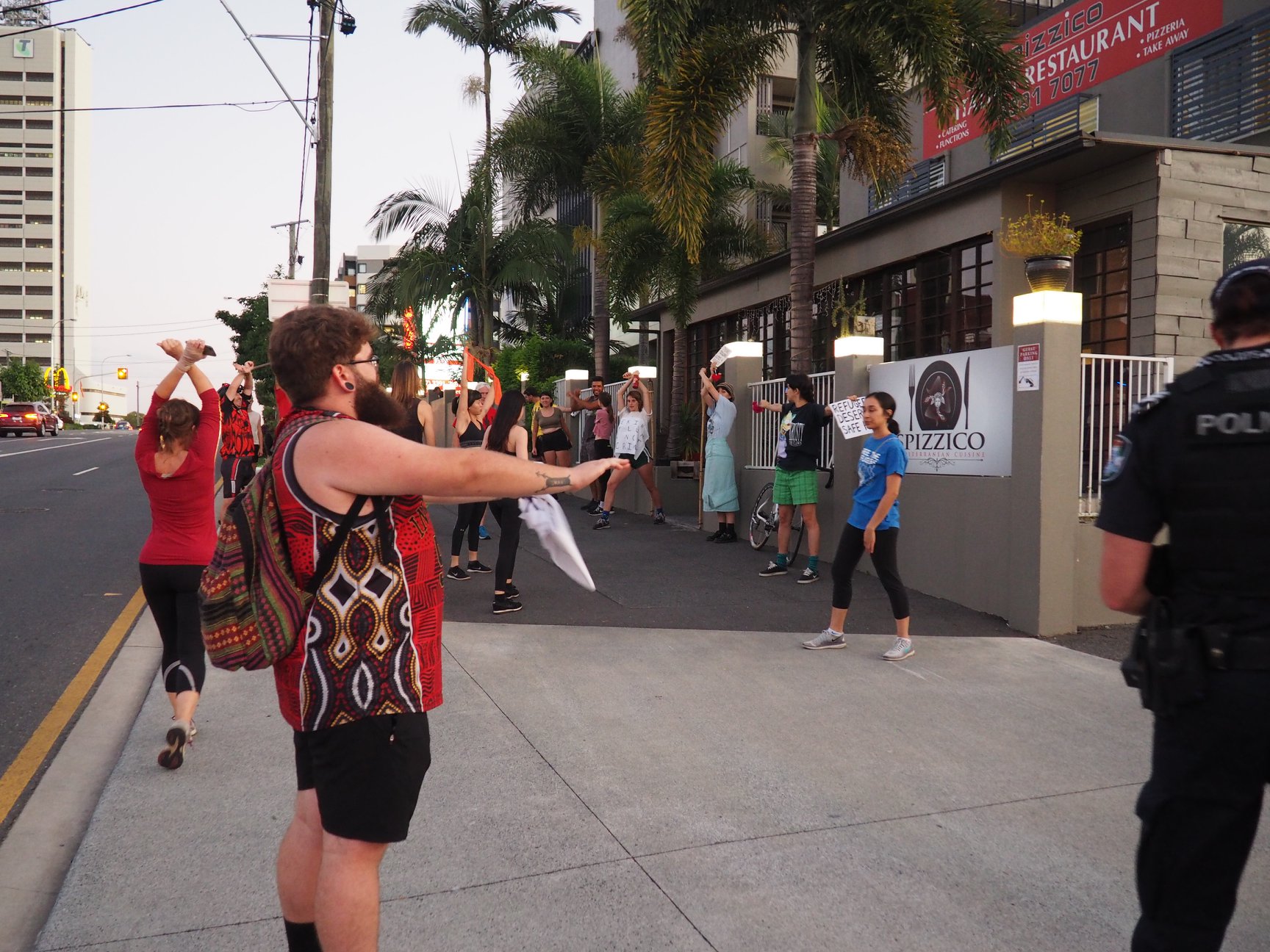
The Kangaroo Point detainees have been holding daily balcony protests for the last month. What are you saying through your demonstration?
We are protesting on the balcony to show Australian people that we have spent seven dark years in the detention, for what? We want to show them that we are in this situation.
We haven’t done anything. But, we have been in detention for a long time. We are not criminals. If we broke some law, why are some of us in the community, and others aren’t?
We were on the same boat. Some people are six years-five years in the community. Some people have been three years in the community – some people one year. But, we all arrived on the same boat?
If we broke some law, why are some people out there like that, and some in here? Why are some of the people now in the USA for three years? But, until now, we are still in detention?
Two weeks ago, the government introduced new legislation that if passed would mean the mobile phones of immigration detainees could be confiscated. What would it mean for those being detained to have their phones taken away?
It is very bad news for people in detention, because we are using phones to contact with family, lawyers and doctors.
The detainees at Kangaroo Point were brought here to undergo medical treatment. But, now you’re being kept locked up during a pandemic.
Regardless of how long COVID-19 sticks around, what are you expecting will happen now that it’s been seven years that you’ve spent in Australian immigration detention?
They brought us here for treatment. But, they haven’t made good treatment for us. They haven’t done anything for us.
For example, I have medical problems, but they haven’t done anything. They took me one time to see the doctor. He gave me some medication and I never saw him again.
We have one person, who has been on a hunger strike. They’ve taken him to the hospital. When he came to Australia for treatment, he had tried to suicide in Nauru.
They brought him here, but then they left him in the same situation. They should send him to the community, because he has a mental problem. He should be sent into the community so someone can look after him. But, they put him in detention.
If they bring us to this hotel and put us again in detention, then very soon we are going to go back to mental and physical problems that we had in Manus Island and Nauru.
They should open the cage for us. They should let us go outside for one or two hours a day.
We had a lot of people that came to Australia underage that were sent to Nauru. Now, they’re in their twenties.
They have more mental problems than us, because it was a bad time for them to be in detention. So, they have more problems than us, because they are so young and disappointed.
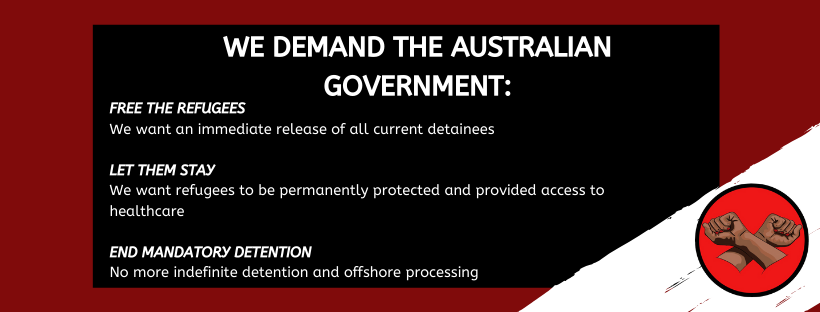
And lastly, Abdullah, you’ve been getting a lot of support from local activists. What has it meant to have the protesters out there visibly supporting you at a time when the government is placing strict limits on their movements?
I want to say thank you to them for supporting us. When these Australian people come here, they give us a lot of energy. And we feel a bit of an exchange. We feel they care about us.
We all came to Australia, because it is a humane country. It is a long time since the refugees came to Australia.
Australia is a humane country, and it should look at us as the same – as humans. We are the same as other refugees who have been sent to other countries – to a third country.
Before COVID-19 kills anyone, I want to say to the minister, we are human. And seven dark years are enough. We need each other. Show some humanity.


